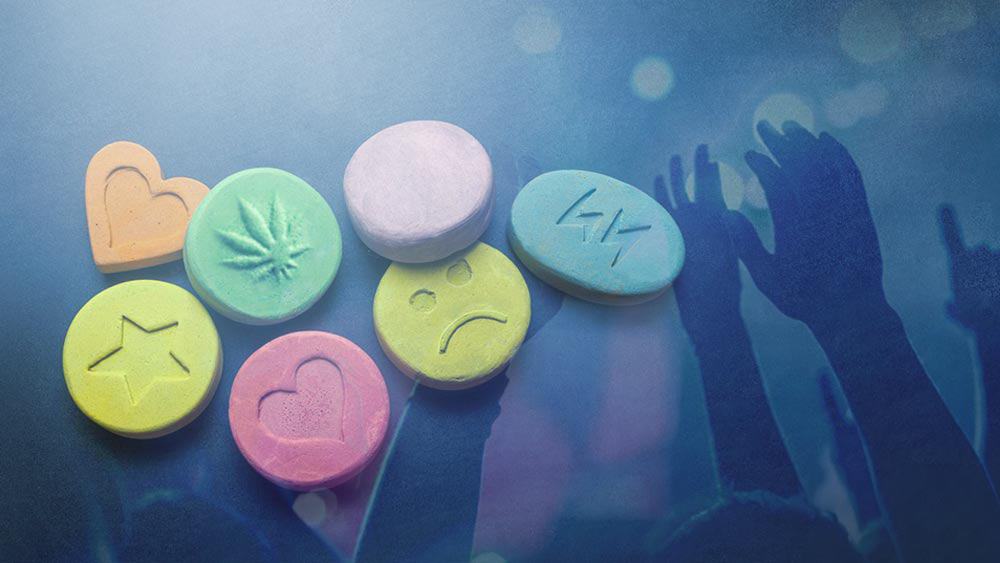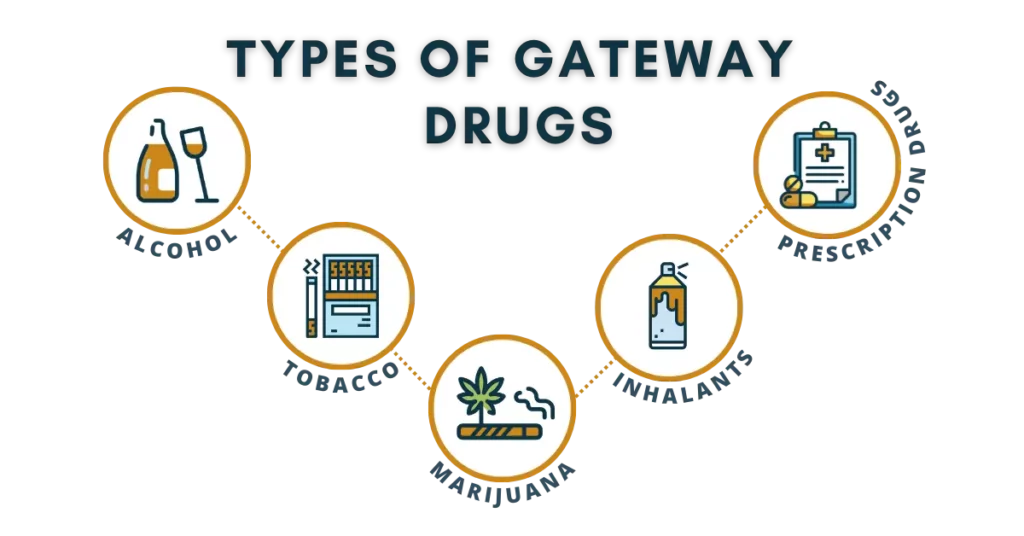What Is a Gateway Drug?
Gateway drugs are substances that, while not necessarily addictive or dangerous on their own, can lead to the use of more dangerous and addictive drugs.
Gateway drugs are usually the first drugs people experiment with before moving on to more addictive and dangerous substances. They can include alcohol, tobacco, marijuana, and prescription drugs. While these substances may not be inherently dangerous, they can lead to the use of more potent and harmful drugs such as cocaine, heroin, or methamphetamine.
This article will discuss gateway drugs, the potential risks of drug use, and how to prevent substance abuse. Understanding the dangers of drug addiction can stop many people from drug use.

What is a Gateway Drug & Substance Abuse Risk
The correlation between gateway drugs and substance abuse is significant. People who use gateway drugs are much more likely to use more dangerous drugs than those who do not. According to the research, people who smoke marijuana are 85 times more likely to try cocaine than those who have never used it.
Understanding the concept of gateway drugs is crucial in preventing substance abuse. By recognizing the risk factors and warning signs of drug addiction, individuals can take steps to avoid it.
The Gateway Drug Theory
The Gateway Drug Theory is the phenomenon of people using lower-risk substances, such as alcohol or nicotine, and then moving on to harder drugs, like cocaine or heroin. This happens once the person’s brain has become accustomed to the high dopamine levels of the lower-risk substances, causing the person to chase that dopamine and have to use harder drugs to achieve this. While this is common in adolescents, anyone can fall victim to gateway drugs.

Types of Gateway Drugs
Wondering what is a getaway drug? Gateway drugs are basically substances that, when used, may lead to the use of other, more dangerous substances. Examples of gateway drugs in popular culture include the use of alcohol and marijuana in movies, TV shows, social media, and music. It is essential to recognize the potential risks of these substances and be mindful of their impact on young people. There are many different kinds of gateway drugs, but here are some common types of gateway drugs:
Alcohol
Alcohol is another common gateway drug. Underage drinking is a significant concern, as it can lead to impaired judgment that may result in using other substances.
Tobacco
Smoking cigarettes, cigars, or pipes is commonly the first drug young people experiment with. Nicotine addiction can lead to using other drugs to heighten the experience.
Marijuana
Marijuana is a widely used drug that is often viewed as harmless. However, using marijuana can lead to the use of other drugs, as it can create a desire for more substantial and intense experiences.
Inhalants
Inhalants are substances that are inhaled to achieve a high. These include aerosol sprays, glue, paint thinner, and other chemicals. Inhalant use can lead to addiction and the use of other drugs.
Prescription drugs
Prescription drugs, like opioids and benzodiazepines, can be gateway drugs, mainly when used recreationally. Many people who become addicted to prescription drugs move on to using heroin, which is chemically similar to some opioids

Risk Factors for Substance Abuse
Substance abuse can be complex, and it is vital to understand the risk factors involved. While many factors can increase the likelihood of substance abuse, gateway drugs can play a particularly significant role. Several risk factors can increase a person’s chance of developing substance abuse issues.
Personal Risk Factors
Personal risk factors for substance abuse include a family history of addiction, mental health issues, or trauma.
Environmental Risk Factors
What is a getaway drug risk factor? Environmental risk factors that increace the likelyhood of getaway drug use include peer pressure, lack of parental supervision, or access to resources like healthcare perscriptions and or medications.
The Role of Gateway Drugs in Substance Abuse
At this point you may be asking, What is a getaway drug risk? When it comes to gateway drugs specifically, using these substances can increase the likelihood of substance abuse even further. Some common types of gateway drugs are often seen as socially acceptable, and many people begin using them without fully understanding the risks involved.
In popular culture, there are many examples of gateway drugs being portrayed in a positive light. For example, many movies and TV shows depict characters using alcohol or marijuana as a way to relax or have fun with friends. While these depictions may seem harmless, they can contribute to normalizing drug use and make it harder for individuals to recognize the risks involved.

How to Prevent Substance Abuse
It is necessary to be mindful of the risks associated with gateway drugs and to take steps to prevent substance abuse. This may involve educating oneself and loved ones about the dangers, seeking professional help, and creating a supportive environment promoting healthy choices and behaviors. By understanding the role of gateway drugs in substance abuse, individuals can take proactive steps to protect their health and well-being.
Prevention Strategies
What is a getaway drug prevention Strategy? Preventing substance abuse is crucial for maintaining a healthy and productive life. One meaningful way to avoid substance abuse is to understand the concept of gateway drugs. Gateway drugs are substances that may not be inherently harmful or addictive but can lead to the use of more dangerous and addictive substances.
Fortunately, there are strategies to prevent substance abuse. Education and awareness about the risks associated with gateway drugs are essential. It can help people make more informed decisions about their substance use.
Understanding the potential risks of these substances and how they can lead to addiction leads to making an informed decision on drug use. Intervention strategies for those at risk of substance abuse, such as counseling and therapy, can also be helpful. Additionally, finding alternative coping mechanisms for stress and emotional pain can be a practical way to reduce the risk of turning to drugs to escape.
Importance of Seeking Help for Substance Abuse
Substance abuse is a severe problem that can have a devastating influence on a person’s life. It can lead to health problems, financial difficulties, and strained relationships. One way that substance abuse can begin is through gateway drugs.
If you are struggling with substance abuse, seeking help as soon as possible is essential. Signs of substance abuse can include changes in behavior, mood, or physical appearance. Seeking help can be challenging but a necessary step in overcoming addiction. Many resources are available for those struggling with substance abuse, including counseling, support groups, and treatment centers.

Find Yourself Again at Asheville Recovery Center
Asheville Recovery Center is where struggling individuals can find hope and freedom from addiction and alcoholism. We believe recovery is possible for anyone willing to take the first step and seek help. If you or a loved one are struggling in addiction recovery, call Asheville Recovery Center today to create a treatment plan to fit your needs.
Our comprehensive addiction treatment program is designed to meet the unique needs of each individual. We understand that everyone’s journey is different, and we strive to deliver personalized care that addresses the root causes of addiction.
At Asheville Recovery Center, we are committed to providing our clients with the compassion and care they need to heal. Natural recovery comes from accountability, love, and community. Our team of experienced professionals is dedicated to creating a supportive and nurturing environment where clients can feel safe and comfortable.






